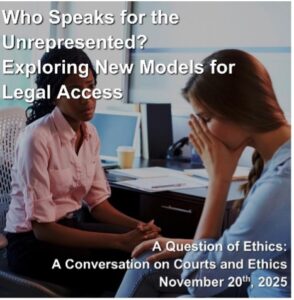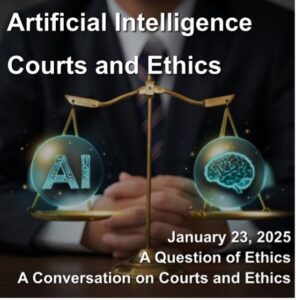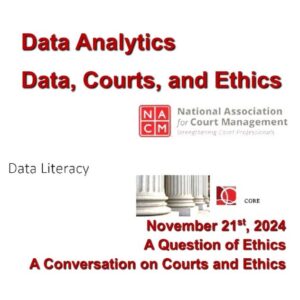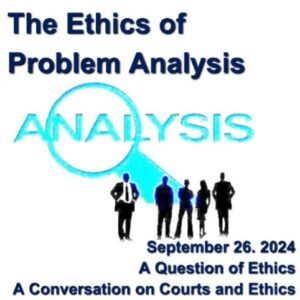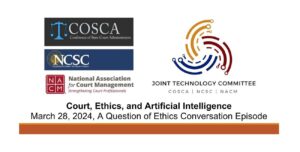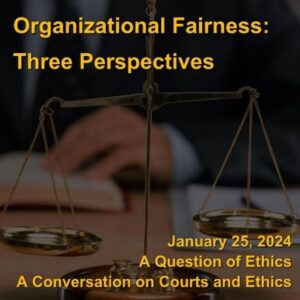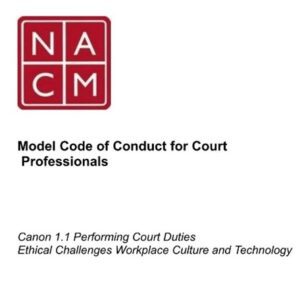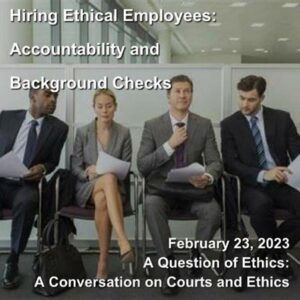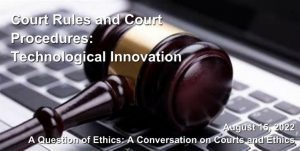Who Speaks for the Unrepresented?
Exploring New Models for Legal Access
November 20th, 2025 A Question of Ethics Podcast Episode
Across America, many communities are in what scholars call “legal deserts,” areas with few, if any, available attorneys to meet the legal needs of local citizens. Rural towns and poor urban neighborhoods often lack affordable access to lawyers, leaving residents without practical guidance for solving their legal problems. This shortage frustrates individuals seeking justice, and undermines confidence in the justice system itself. It widens the gap between those who can afford representation and those who cannot.
To help bridge this gap, a few states (for example, Utah, Alaska, and now Oregon), are experimenting with using non-attorney legal advocates. These are trained professionals, often known as Community Justice Workers, who work under the guidance of a practicing attorney. Others, in Arizona for example, are called Certified Community Legal Advocates. They are untethered from a practicing lawyer.
These non-attorney advocates can assist people in certain specific legal areas including:
- family law
- landlord-tenant disputes
- employment issues
- government benefits
- domestic violence, or
- debt collection.
These advocates work within the limitations prohibiting non-lawyers from offering what is defined as “legal advice,” a boundary carefully guarded by the laws governing the unauthorized practice of law. This prohibition is also codified in NACM’s Model Code of Conduct for Court Professionals. Canon 1.7 states “A court professional is responsive to inquiries regarding standard court procedures but does not give legal advice unless required as part of one’s official position.” While these restrictions safeguard the public from unqualified guidance, they also constrain non-lawyers from fully helping individuals through complex legal processes. These restrictions raise difficult questions about the balance between consumer protection and access to justice.
In this episode we are talking about communities that are “legal deserts,” where residents lack access to affordable legal help. Some states are experimenting with non-attorney legal advocates to bridge this gap. Is this a model for the future?
Today’s Panel
Maggie Humm Executive Director of the Alaska Legal Services Corporation in Anchorage.
Sarah Carver Co-director of the Alaska Legal Services Corporation’s Community Justice Workers Resource Center.
Creadell Webb Diversity, Equity, and Inclusion Officer for the 1st Judicial District Court, in Philadelphia, Pennsylvania,
Liz Rambo Trial Court Administrator for the Lane County Circuit Court, in Eugene, Oregon
Leave a question or comment about the episode at ethics@nacmnet.org
Become Part of the Conversation
Join the Question of Ethics Conversation held after the Ethics Subcommittee meetings every fourth Thursday of the bi-monthly at 2:00 ET.
Additional Resources:
- Time Marker Sheet
- Transcript
- Community Justice Workers Part of the Solution to Alaska's Legal Deserts
- More than half of rural counties are legal deserts, ISU study finds
- Understanding Rural Legal Deserts to Inform Public Policy: Identifying and Describing Lawyer Gaps in Non-Metropolitan Counties
Don't have time to watch the episode? You can listen to the episode on your way to or from work:
Artificial Intelligence: Ethics and Courts
January 23, 2025, A Question of Ethics Conversation Episode
Artificial intelligence has the potential to reshape the judicial system. AI-powered tools, from legal research assistants to sentencing algorithms and customer service chatbots, offer efficiency but also introduce risks, particularly bias. Additionally, the confidentiality of court records and legal proceedings becomes a pressing concern, as AI systems require vast sums of data for training—potentially exposing sensitive information to breaches or misuse.
While AI chatbots improve accessibility by guiding litigants through procedural questions, the possibility of providing incorrect information and the prohibition against providing legal advice highlights the need for careful human oversight.
As courts integrate AI into their operations, how do we ensure transparency, accountability, and fairness? What ethical and legal questions arise?
Here to discuss those pressing questions are:
Our moderator today is Creadell Webb, Chief Diversity, Equity, and Inclusion Officer for the 1st Judicial District in Philadelphia, Pennsylvania.
On today's panel is:
- Courtney Whiteside, Director, Municipal Court, St. Louis, Missouri. Courtney is also the chair of the NACM Ethics Subcommittee.
- Alison Braaton, the Clerk of District Court in Grand Forks County, North Dakota.
- Andrea Powers, Human Resources Director of the Idaho Court System in Boise
- Amy Emig, Business Development Manager, for the Multnomah Circuit Court, in Portland, Oregon
- Kelly Hutton, Court Administrator for the North Dakota Court System in Gand Forks
- Peter Kiefer host of the Court Leader’s Advantage Podcast Series
- Nickolas Brackley, IT Specialist for the Oregon Judicial Department Circuit Court, in Salem
- Norman Meyer, Retired Clerk of the United States Bankruptcy Court for the District of New Mexico and
- Roger Rand, IT Manager for the Multnomah Circuit Court, in Portland, Oregon
Leave a question or comment about the episode at ethics@nacmnet.org
Become Part of the Conversation
Join the Question of Ethics Conversation held after the Ethics Subcommittee meetings every fourth Thursday of the month at 2:00 ET.
Additional Resources:
Don't have time to watch the episode? You can listen to the episode on your way to or from work:
Data Analytics: Data, Courts, and Ethics
November 21, 2024, A Question of Ethics Conversation Episode
Copilot describes data literacy as understanding, interpreting, and using data effectively. It involves knowing how to read charts and graphs, understanding statistics, and being able to critically evaluate data sources for their reliability and relevance. Just as how literacy with words helps you comprehend and communicate in language, data literacy empowers you to navigate and make sense of the vast amounts of data we encounter daily. Problem Analysis is an often-overlooked component of decision-making. In this episode we discuss data literacy and how it intersects with ethics in the courts.
Episode Moderator:
Roger Rand, IT Manager, Multnomah County Circuit Court, Portland, Oregon
Episode Panel:
Courtney Whiteside, Director, Municipal Court, St. Louis, Missouri. Courtney is also the chair of the NACM Ethics Subcommittee.
Stacy Worby, State Jury Coordinator, Alaska State Court System, Anchorage.
Ellen Haines, Supervisor, IT Training & Data Analysis Department, Multnomah Circuit Court, Portland, Oregon
Peter Kiefer, Host, Court Leaders Advantage Podcast Series, Auburn, New York.
Jeff Chapple, Court Administrator, Municipal Court, O'Fallon, Missouri.
Creadell Webb, Chief Diversity, Equity, & Inclusion Officer, 1st Judicial District, Philadelphia, Pennsylvania.
Leave a question or comment about the episode at ethics@nacmnet.org
Become Part of the Conversation
Join the Question of Ethics Conversation held after the Ethics Subcommittee meetings every fourth Thursday of the month at 2:00 ET.
Additional Resources:
Don't have time to watch the episode? You can listen to the episode on your way to or from work:
Ethics and Problem Analysis
September 26, 2024, A Question of Ethics Conversation Episode
Problem Analysis is an often-overlooked component of decision-making. There are several highly effective business problem analysis models, each tailored for different types of challenges. Some of the most popular models:
- Root Cause Analysis which includes techniques such as “The Five Whys” and the “Ishikawa Fishbone Diagram”
- SWOT Analysis (Strengths, Weaknesses, Opportunities, Threats)
- Gap Analysis which includes identifying gaps between where an organization is and where it needs to be, then focusing on areas of improvement.
There are several ethical concerns when conducting good problem-identification and analysis.
- What if you cannot obtain the political buy-in needed to properly analyze the problem?
- How do you properly identify and analyze a business problem with a strong political undercurrent?
- How do you proceed if a solution is already laid out for you?
- When we become operationally aligned with a decision-maker do we run the risk of “preemptive avoidance” where we decide not to initiate a topic because we know it will provoke a negative response?
Today’s Panel
- Samantha Wallis: Deputy Trial Court Administrator, Supreme Court, Coeur d’Alene, Idaho
- Rick Pierce - Judicial Programs Administrator, Administrative Office of the Pennsylvania Courts
- Stacy Worby - State Jury Coordinator for the Alaska Court System
- Creadell Webb - Chief Diversity, Equity, & Inclusion Officer, 1st Judicial District, Philadelphia, Pennsylvania
Leave a question or comment about the episode at ethics@nacmnet.org
Become Part of the Conversation
Join the Question of Ethics Conversation held after the Ethics Subcommittee meetings every fourth Thursday of the month at 2:00 ET.
Additional Resources:
A Framework for Ethical Decision Making
Ethical Decision Making Models and 6 Steps of Ethical Decision Making Process
Don't have time to watch the episode? You can listen to the episode on your way to or from work:
Court, Security, and Disabilities
June 27, 2024, A Question of Ethics Conversation Episode
Robert Granzow, Director of the Office of Judicial District Security at the Pennsylvania Supreme Court’s Administrative Office of Pennsylvania Courts, talks about safety, security, and dealing with disabilities in the court environment.
Equal access to justice can only be realized in an environment of safety and security. We must ensure the safety of those with and those without disabilities. Disabilities can include, physical, traumatic, psychological, mental illness, congenital birth defects, personality disorders, addictive disabilities, as well as cultural and language differences.
We live in a rapidly changing threat landscape. Courts all stakeholders at the table and need to conduct a comprehensive security assessment, preferably using a gap analysis. Courts must have political buy-in from the highest level. We need to make data-driven decisions.
Solutions include training in de-escalation and non-escalation; recognizing the signs of people in crisis; using new classes of employees such as court navigators. We need to consider new innovative and technological solutions such as expanded use of videoconferencing, innovative security wanding techniques, and using AI to identify litigants who are suspicious.
You don’t want to miss this insightful discussion.
Joining in the Conversation:
Rick Pierce - Judicial Programs Administrator, Administrative Office of the Pennsylvania Courts
Roger Rand - IT Manager for the Multnomah Circuit Court in Portland, Oregon
Courtney Whiteside - Director of the St. Louis County Municipal Court
Stacy Worby - State Jury Coordinator for the Alaska Court System
Erika Schmid - Supervisor, Multnomah Circuit Court in Portland, Oregon
Peter Kiefer - Host of the Court Leader's Advantage Podcast Series
Creadell Webb - Chief Diversity, Equity, and Inclusion Officer 1st Judicial District of Pennsylvania
Leave a question or comment about the episode at ethics@nacmnet.org
Become Part of the Conversation
Join the Question of Ethics Conversation held after the Ethics Subcommittee meetings every fourth Thursday of the month at 2:00 ET.
Additional Resources:
MJD Security Self-Assessment Form
AOPC County Courthouse Security Self-Assessment
Don't have time to watch the episode? You can listen to the episode on your way to or from work:
NACM 2024 Annual Conference Ethics Session: AI, Courts, and Ethics, Can We Harness Artificial Intelligence?
Tuesday, July 23, 2024
The ethics of artificial intelligence (AI) is a critical consideration as the technology becomes more integrated into society and into our courts. In even the short time that AI has been advancing, this new technology has become ingrained into how we interact with each other. Key ethical concerns include can laws and rules keep up with AI; to ensure accountability must a human be in the loop; can we keep confidential and personal data away from AI; and will AI reduce disparity and unfair treatment of groups or will it exacerbate inequality.
At the 2024 NACM Annual Conference in New Orleans, Karl Thoennes and Peter Kiefer hosted an interactive session on artificial intelligence, ethics, and courts. The link to the PowerPoint of that session is below and includes video interviews with:
• Kevin Bowling on whether courts can forbid litigants from using artificial intelligence;
• Stacy Marz on whether laws and court rules will be able to keep up with how quickly AI is advancing;
• Roger Rand on how important is it to keep a “human-in-the-loop”;
• Casey Kennedy on whether we can keep artificial intelligence from gathering confidential and personal data;
• Alan Carlson on whether or not AI will in fact “level-the-playing-field”?
All the individuals interviewed participated in the development of NACM’s AI Guide. Along with the interviews, Karl and Peter conducted electronic audience polls on the topics. The results of those polls are included in the PowerPoint.
Court, Ethics, and Artificial Intelligence
March 28, 2024, A Question of Ethics Conversation Episode
Join Kevin Bowling as we discuss the ethical issues surrounding the burgeoning topic of courts’ use of artificial intelligence (AI). Kevin discusses a definition of AI and specifically generative AI, existing practical uses in the courts, some misuses of IA, the need for policy and data governance, ethics issues, and the need for transparency to promote public trust and confidence.
Kevin also publicly acknowledges the work of Roger Rand and Casey Kennedy, the entire Joint Technology Committee, as well as gives a sneak peek at the, soon-to-be-released, NACM AI Guide.
Moderator:
Kevin Bowling, Retired Circuit Court Administrator, Ottowa County, Michigan
Joining in the Conversation:
Courtney Whiteside Director, Municipal Court, St. Louis, Missouri
Creadell Webb: Chief Diversity, Equity, and Inclusion Officer; First Judicial District, Philadelphia, Pennsylvania
Erika Schmid, Supervisor, Multnomah County Circuit Court, Portland, Oregon
Stacy Worby: State Jury Coordinator, Alaska Court System, Anchorage
Leave a question or comment about the episode at ethics@nacmnet.org
Become Part of the Conversation
Join the Question of Ethics Conversation held after the Ethics Subcommittee meetings every fourth Thursday of the month at 2:00 ET.
Additional Resources:
FLI_Policymaking_In_The_Pause Open Letter
Don't have time to watch the episode? You can listen to the episode on your way to or from work:
Organizational Fairness: Three Perspectives
January 25, 2024, A Question of Ethics Conversation Episode
Welcome to the latest episode of A Question of Ethics Conversation. The topic for this discussion is Organization Fairness. The October 26th, 2023, Question of Ethics Conversation hosted by Samantha Wallis, brought up many interesting questions. One set of questions revolved around the concept of fairness.
We are all dedicated to fairness and take it seriously, Canon1.3 of NACM’s Model Code for Court Professionals speaks to fairness. It reads that the court professional makes the court accessible and conducts his or her business without bias or prejudice. Fairness is actually mentioned nine different times in the Model Code
Fairness, however, is subjective. Everyone has their own idea of what is fair. What I consider fair may not be the same as how you see things. What are the perceptions of fairness in an organization, particularly a court organization?
Employees often express perceptions of fairness, with which we, as managers, might disagree. Although not all employees hold these perceptions, they are common enough that it might be instructive to ask if we, as managers, can craft responses that can convince employees of a different view of fairness. Can we come up with something more than just saying “the organization has determined the following policy is fair, the topic is not up for debate.”
This Conversation recounts three specific perceptions that some employees have. The panel will discuss if there is some sort of response that could persuade employees of the validity of a different concept. In essence, is there a response that might change “hearts and minds?”
- Perception 1
A manager needs to be able to perform the desk work of every employee he or she manages. If he or she cannot, that manager has no right to conduct performance reviews of the employees.
- Perception 2
Managing employees is just using common sense. There is no great skill involved in management. It is ridiculous that courts pay exorbitant salaries to managers for just using their common sense.
- Perception 3
The employee’s manager is not the employee’s friend. If an employee gets into trouble at work and they need an advocate. The manager will not save them.
Today’s Moderator
Peter Kiefer: Host of the Court Leader’s Advantage Podcast Series
Today’s Panelists
Samantha Wallis: Deputy Trial Court Administrator, Supreme Court, Coeur d’Alene, Idaho
Creadell Webb: Chief Diversity, Equity, and Inclusion Officer; First Judicial District, Philadelphia, Pennsylvania
Stacy Worby: State Jury Coordinator, Alaska Court System, Anchorage
Rick Pierce: Judicial Programs Administrator, Administrative Office of the Courts, Harrisburg, Pennsylvania
Leave a question or comment about the episode at ethics@nacmnet.org
Become Part of the Conversation
Join the Question of Ethics Conversation held after the Ethics Subcommittee meetings every fourth Thursday of the month at 2:00 ET.
Additional Resources:
Don't have time to watch the episode? You can listen to the episode on your way to or from work:
Courts, Workplace Culture, and Technology
August 24, 2023, A Question of Ethics Conversation Episode
Today’s Question of Ethics Conversation looks at workplace culture and technology. It focuses on the ethical challenges to workplace culture and technology as it pertains to Canon 1.1 of the NACM Model Code of Conduct which states that a court professional faithfully carries out all appropriately assigned duties, striving at all times to perform the work:
- Diligently - characterized by steady, earnest, and energetic effort.
- Efficiently - capable of producing desired results with little or no waste (as of time or materials)
- Equitably - dealing fairly and equally with all concerned
- Thoroughly - in a complete or thorough manner
- Courteously - marked by respect for and consideration of others
- Honestly – without cheating, genuine, without frills
- Openly -exposed to general view or knowledge
- Scope of the court professional’s authority.
According to the Society for Human Resources Management (SHRM), an organization's culture defines the proper way to behave within the organization. This culture consists of shared beliefs and values established by leaders and then communicated and reinforced through various methods, ultimately shaping employee perceptions, behaviors and understanding. Organizational culture sets the context for everything an enterprise does. Because industries and situations vary significantly, there is not a one-size-fits-all culture template that meets the needs of all organizations.
Workplace culture has a profound effect on any organization as these statistics bear out.
- 53% of working Americans who have left a job due to workplace culture report leaving because of their relationship with their manager.
- 94% of people managers agree a positive workplace culture creates a resilient team of employees.
- 97% of executives agree their actions have a direct impact on workplace culture
Technology is a tool, but it can have a dramatic effect on workplace culture. “Technology can be used to enhance information and operations, improve public access to court information and services, and reduce administrative costs while increasing efficiency in case processing.”
This Question of Ethics Conversation looks at how technology plays a role in workplace culture for court users, for one’s co-workers, and on a court’s institutional knowledge.
Today’s Moderator
Creadell Webb: Chief Diversity, Equity, and Inclusion Officer; First Judicial District, Philadelphia, Pennsylvania
Today’s Panel
Courtney Whiteside: Director, Municipal Court, St. Louis, Missouri
Karl Thoennes: Court Administrator, 2nd Judicial Circuit, Sioux Falls, South Dakota
Peter Kiefer: Retired Court Professional
Samantha Wallis: Deputy Trial Court Administrator, Supreme Court, Coeur d’Alene, Idaho
Cecelia Garner: Court of Court, General District Court, Richmond, Virginia
Leave a question or comment about the episode at ethics@nacmnet.org
Additional Resources:
Don't have time to watch the episode? You can listen to the episode on your way to or from work:
Quiet Quitting:
What Is It? What Should We Do About It?
April 27, 2023, A Question of Ethics Conversation Episode
“Quiet Quitting.” It is a topic that many of us have heard about. In an era where it is a challenge to hire employees, is “Quiet Quitting” an emerging change in the contract between the court and employees or is it just a new term for some staff not doing their jobs?
In the past it has been given many names: “retiring in place”, “phoning it in,” or “checking out.” What makes this iteration unusual is that it seems to be a mantra heard from younger workers. Millennials and Gen Z workers have often uttered this expression.
- What is Quite Quitting?
- What are the ethical challenges the court faces to ensure professionalism and diligence of staff?
- How can we ensure that we have a common understanding with staff?
- Is this a new term for an old problem?
- What Should we do about It?
Today’s Moderator
Eric Silverberg: Court Administrator, Municipal Court, Tucson, Arizona
Today’s Panel
Courtney Whiteside: Director, Municipal Court, St. louis, Missouri
Kent Pankey: Senior Planner, State Supreme Court, Richmond, Virginia
Norman Meyer: Retired Clerk of Court, United States Bankruptcy Court, Albuquerque, New Mexico
Peter Kiefer, Retired Court Professional
Tina Mattison: Deputy Court Administrator, Consolidated Justice Court, Tucson, Arizona
Karl Thoennes: Court Administrator, Second Judicial Circuit Court, Sioux Falls, South Dakota
Samantha Borden: Staff Assistant, Customer Solutions Division, Water Department, Tucson, Arizona
Leave a question or comment about the episode at ethics@nacmnet.org
Additional Resources:
Quiet Quitting Is A Sign of a Deeper Problem
Why Quiet Quitting Is a Sign of Management Failure
Humorous Video of Different Generations
https://www.youtube.com/watch?v=2ZURp0qvVho
https://www.youtube.com/watch?v=UU16i34Ss2E
https://www.youtube.com/watch?v=7wj2XFvJBdY
https://www.youtube.com/watch?v=u5YfJV12Xyo
Hiring Ethical Employees:
Accountability and Background Checks
February 23, 2023, A Question of Ethics Conversation Episode
This is the second of a two-part conversation on hiring ethical employees. Part-one, (held January 26th, 2023), is available on the Ethics Subcommittee Webpage, on the NACM website.
What actions can a court take to optimize the hiring of ethical staff? What can you do to ensure that the people you hire will adhere to your court’s Code of Conduct? Relying on Bruce Weinstein’s book, The Good Ones: Ten Crucial Qualities of High Character Employees, the panel discusses the options courts have to identify ethical employees including interview questions about accountability and background checks. The panel considers questions including:
- Describe a situation in which you took responsibility for a mistake you made. What were the consequences to you for doing so?
- Have you ever taken responsibility for an error that another team member made? Tell me about it.
- Tell me about a typical working day.
Other options the panel discusses include calling references, calling past supervisors, conducting criminal history checks, conducting financial history checks, and drug testing. Finally, Norman Meyer introduces interview questions developed by ChatGPT. Some of the questions include:
- Can you give an example of a time when you had to make an ethical decision in your previous work experience? How did you handle the situation?
- How do you define ethical behavior, and how do you ensure that you are acting ethically in the workplace?
- Have you ever witnessed unethical behavior in the workplace? If so, how did you handle the situation?
- How do you handle conflicts of interest?
- Can you give an example of a time when you had to speak up or take a stand on an ethical issue, even if it was difficult or unpopular?
Today’s Moderator
Norman Meyer: Retired Clerk for the Federal Bankruptcy Court, District of New Mexico
Today’s Panel
Courtney Whiteside: Director, Municipal Court, St. louis, Missouri
Stacy Worby: State Jury Coordinator, Alaska State Court System
Peter Kiefer: Retired Court Professional
Joe Tommasino: Staff Attorney, Justice Court, Las Vegas, Nevada
Leave a question or comment about the episode at ethics@nacmnet.org.
Additional Resources:
Hiring Ethical Employees:
How Can We Hire "The Good Ones"?
January 26, 2023, A Question of Ethics Conversation Episode
What actions can a court take to optimize the hiring of ethical staff? What can you do to ensure that the people you hire will adhere to your court’s Code of Conduct? Relying on the book by Bruce Weinstein, The Good Ones: Ten Crucial Qualities of High Character Employees, the Ethics Subcommittee explores some of the personal qualities that ethical employees possess. These qualities include honesty, accountability, care, courage, fairness, gratitude, humility, loyalty, patience, and presence. What can we do during the selection process to ensure that we hire employees with these qualities?
Today’s Moderator
Norman Meyer: Retired Clerk for the Federal Bankruptcy Court, District of New Mexico
Today’s Panel
- Courtney Whiteside: Director, Municipal Court, St. louis, Missouri
- Stacy Worby: State Jury Coordinator, Alaska State Court System
- Peter Kiefer: Retired Court Professional
- Eric Silverberg: Court Administrator for the City Court in Tucson, Arizona
- Karl Thoennes: Court Administrator, 2nd Judicial Circuit Court, Sioux Falls, South Dakota
- Stacy Owsley: Deputy Human Resources Director, Pima County Superior Court, Tucson, Arizona
- Rick Pierce: Judicial Programs Administrator, Pennsylvania Administrative of the Courts.
Leave a question or comment about the episode at ethics@nacmnet.org.
Additional Resources:
The video is 40 minutes 42 seconds long.
The audio is 38 minutes 46 seconds long.
Courts and Inside Information:
What Can and Should We Do with What We Learn at Work?
September 22nd A Question of Ethics Episode
We are not stockbrokers or day traders, but in our role as court employees we learn a lot. We know about patterns of litigation against businesses and against professionals in the community. We know about protection orders filed against real estate agents; we know about leaking basement litigation; we know about roofing contract litigation. Many cases are sealed and confidential, but most are wide open and available to the public if it takes the time to do the research. Due to the nature of our jobs, we learn about inside information more frequently than the public.
- What is the appropriate use of this information?
- Have you ever applied information obtained at work to our personal lives?
- Do you think it is appropriate for front line staff to share inside court information?
- Are there some applications of inside information that are ethically okay?
Today’s Moderator
Karl Thoennes: Court Administrator for the Second Judicial Circuit, Sioux Falls, South Dakota
Today’s Panel
- Dawn Palermo: Judicial Administrator for the Jefferson Parish Juvenile Court in Harvey, Louisiana
- Kent Pankey: Senior Planner for the Supreme Court of Virginia
- Peter Kiefer: Retired Court Professional
- Eric Silverberg: Court Administrator for the City Court in Tucson, Arizona
Leave a question or comment about the episode at ethics@nacmnet.org.
Additional Resources:
Court Rules and Court Procedures: Technological Innovation
A Question of Ethics Conversation: August 15, 2022
The COVID Pandemic brought the use of technology to the forefront of our conversation worldwide. Technology is expanding at breakneck speed. Is it out stripping courts' ability to manage new technological innovations?
Relevant Ethics Canons
Canon 1 Avoiding Impropriety and the Appearance of Impropriety in All Activities
1.1 Performing Court Duties
A court professional faithfully carries out all appropriately assigned duties, striving at all times to perform the work diligently, efficiently, equitably, thoroughly, courteously, honestly, openly, and within the scope of the court professional’s authority.
Canon 2 Performing the Duties of Position Impartially and Diligently
2.1 Independent Judgment
A court professional avoids relationships that would impair one’s impartiality and independent judgment. A court professional is vigilant concerning conflicts of interest and ensures that outside interests are never so extensive or of such a nature as to impair one’s ability to perform court duties.
Discussion Questions
- How can courts implement new technological innovations without infringing on Constitutional rights?
- How can court administrators convince judges who are resistant to change that technology is beneficial?
- What strategies can courts use to alleviate the digital divide?
Today’s Host
Courtney Whiteside, Director St. Louis Municipal Court
Today’s Panel
- Stacy Worby, State Jury Coordinator, Alaska State Court System
- Kent Pankey, Senior Planner, Virginia Supreme Court
- Karl Thoennes, Court Administrator, 2nd Judicial District, Sioux Falls, South Dakota
- Joe Tommasino, Legal Counsel, Justice Court, Las Vegas, Nevada
- Peter C. Kiefer, Retired Court Professional
Leave a question or comment about the episode at ethics@nacmnet.org.
Additional Resources:
Time Marker Sheet
Diversity, Equity, Inclusion: Political Agendas and Affirmative Action by Court Leader's Advantage
A Question of Ethics Conversation: May 2022
NACM has made a commitment to the values of providing equal justice regardless of race, gender, age, ethnicity, sexual orientation or identity, disability, or social economic status. What is the court’s ethical obligation, particularly when it comes to implementing court operations?
This episode of A Question of Ethics will continue to explore diversity, equity, and inclusion (DEI), and NACM’s commitment to helping provide equal justice. This session was recorded after the Ethics Subcommittee Conference Call on April 28th, 2022. The questions the group explored include:
- Does focusing on Diversity, Equity, and Inclusion policies, and programs conflict with the court’s purpose to be a separate, independent, and impartial forum for resolving disputes?
- How do courts keep political agendas out of its efforts to make court personnel and court process equitable for all?
- How does implementing DEI policies and programs compare to Affirmation Action requirements?
- How can courts today be more inclusive and accessible to those having business before it?
Relevant Canons from the NACM Code of Conduct for Court Professionals:
-
- Canon 1.1: Performing Court Duties A court professional faithfully carries out all appropriately assigned duties, striving at all times to perform the work diligently, efficiently, equitably, thoroughly, courteously, honestly, openly, and within the scope of the court professional’s authority.
-
- Canon 1.3: Fairness The court professional makes the court accessible and conducts his or her work without bias or prejudice.
-
- Canon 1.4 Respect for Others A court professional treats litigants, co-workers, and all others interacting with the court with dignity, respect, and courtesy.
-
- Canon 4.1 Inappropriate Political Activity (Paraphrased) A court professional:
-
- retains his or her right to vote
- engages in political activity strictly as a private citizen, in accordance with Federal and state law, with local court rule, and with the policy of the appropriate local governing authority.
- participates in political activity only during non–court hours
- uses only non–court resources
- Never uses his or her position to politically influence others.
Additional Resources:Diversity, Inclusion and Courts
Leave a question or comment about the episode at ethics@nacmnet.org
Diversity, Equity, Inclusion: What is the Court’s Duty? by Court Leader's Advantage
A Question of Ethics Conversation: Summer 2022 Edition of the Court Manager
Courts, Testing, and Vaccinations: What Will Your Court Decide?
A Question of Ethics: A Video Conversation on Courts and Ethics

